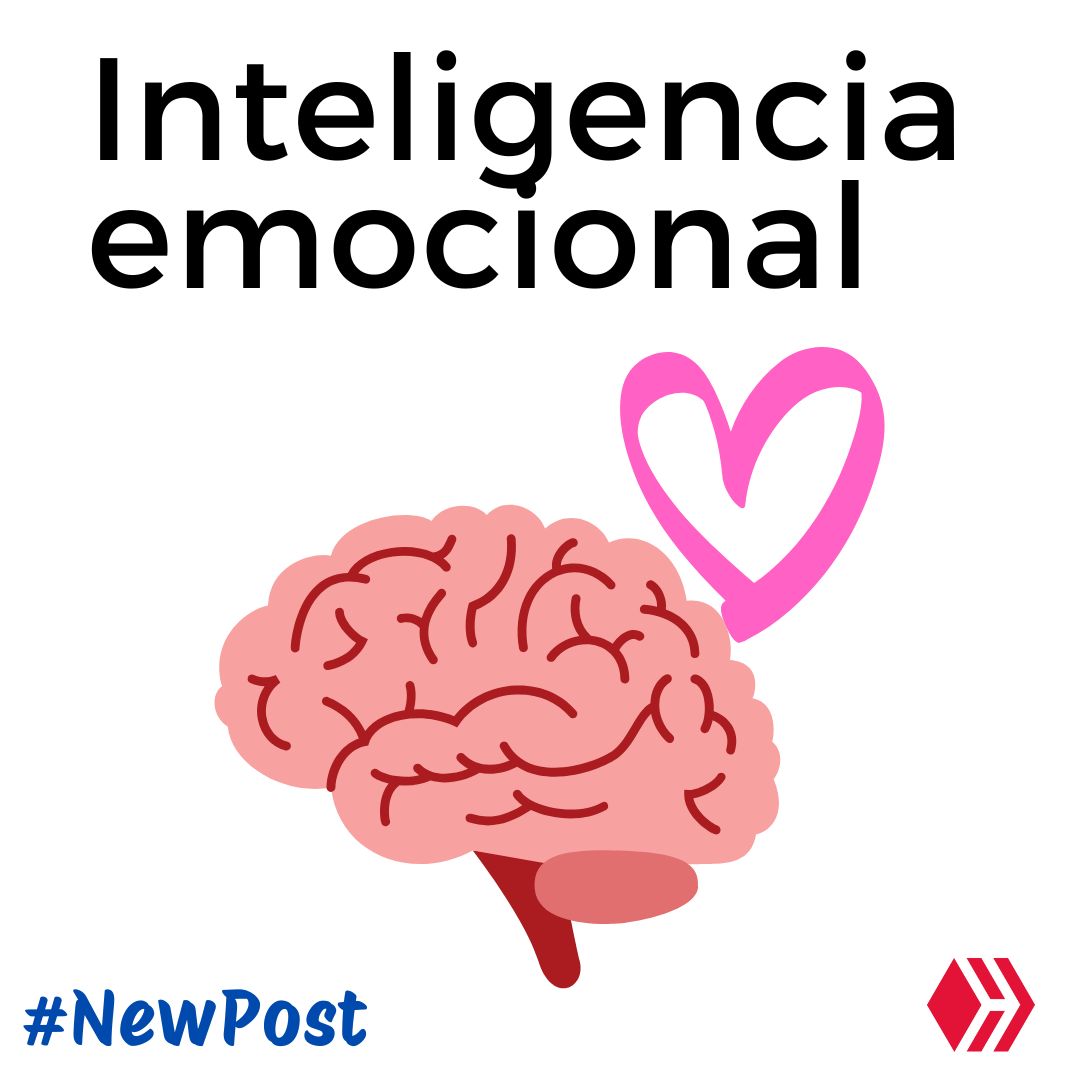
(Imagen creada por canva)

Hola como estan, estoy en otro " Modo aleh ", con experiencias y sobre temas relacionados con ideas o reflexiones de mis investigaciones existencialistas.
Tener mucha madurez, paz e inteligencia, hoy puede ser de las bases de la adultez, todas con derivados emocionales y de salud mental.
Inteligencia Emocional
(IE) Su abreviación científica, es la habilidad de comprender, manejar y utilizar nuestras otras emociones, como empatizar con otros, esto implica reconocer, aceptar y hasta, otros relaciones personales, esta se define en varios elementos.
La definición populares de inteligencia se hacen importantes los aspectos cognitivos, como la memoria y la capacidad para resolver problemas , Edwar thorndike, en 1920 la definición " inteligencia social " esto para describir habilidades para comprender y motivar a las personas. En 1940 david wechsler sostuvo que los factores no intelecticvos sobre comportamiento, pero se tenía que estudiar más los factores. Dándole a Howard Gardner en 1983, sacando su libro " Inteligencias múltiples ". Pero quien uso el término fue Wayne payne, citando en una tesis 1985, dándole a la historia 164, que ya estaba en textos de beldoch y Leunes 1966 Stanley Greenspan también propuso en 1989.
Características principales
Las emociones se generan como una respuesta organizada a un acontecimiento externo o un suceso interno (Pensamiento, imagen o conducta)
Características Emocionales
-
Emociones positivas ( Alegrías, humor, amor y felicidad )
-
Emociones negativas ( Miedo, ansiedad, ira , rechazo, tristeza, vergüenza)
-
Emociónes ambiguas ( Sorpresa, esperanza y compasión )
Emociónes : Lentas / Rápidas
La importancia evolutiva de ofrecer una respuesta rápida qué permitiera ganar unos milisegundos críticos ante situaciones religiosas debió ser vital para nuestros antepasados pues esa configuración ha quedado impresa en el cerebro de todo protomamifero, incluyendo los humanos.
Autoconciencia
Reconocer y entender nuestras propias emociones y como nos afectan
Autorregulacion
Gestiónar nuestras propias emociones de manera afectiva, evitando reacciones impulsiva o negativas.
Autoconocimiento
Es la habilidad de comprender el estado internos y reconocer los propios recursos emociónes, fortalezas, creencias limitantes y valor personal.
Habilidades sociales
Relaciones con los demás de maneras efectivas, construir relaciones sólidas y resolver conflictos
Gestión de las emociones
Conocida como Autorregulacion, se trata de saber gestionar las emociones con este estilo de comunicación asertivo, siendo la manera correcta.
Empatia
Se refiere a la consciencia de las emociones y necesidades de terceros y como respondemos ante ellos.
Importancia de la inteligencia emocional
Gracias a la " inteligencia emocional " es posible superar los errores, colocar límites sanos, trabajar con eficiencia en ambientes colaborativos desarrollar, el aceptar críticas, saber escuchar y evitar los prejuicios.
- La autoestima
- La empatia
- El autocontrol
- La confianza personal
- Metas claras
- La motivación al logro
- Decisiones asertivas
- Sentido de la responsabilidad
¿Tendencia actual?
No deberia serlo, sino estar entre los herramientas para nuestro desarrollo personal. No poder desarrollar la inteligencia emocional nos frustra como adultos, al no saber ser parejas, amigos, padres hasta hijos, arrastrando patrones tóxicos y solo cuando sabemos en terapia que jamás la hemos puesto en práctica. Ahora es un requisito estar en los 35 a 45 años con inteligencia emocional y estar o haber pasado por terapia, esto ayuda realmente parte de nuestraz desiciones amorosas, para poder tener un cambio significativo personal ante otros, diferenciado muchas cualidades autocontrol, motivación, empatia y responsabilidad.
[LINK] (https://es.m.wikipedia.org/wiki/Inteligenciaemocional)
Hello, I'm on another " Modo aleh ", with experiences and on topics related to ideas or reflections of my existentialist research.
Having a lot of maturity, peace and intelligence, today can be the basis of adulthood, all with emotional and mental health derivatives.
Emotional Intelligence
(EI), its scientific abbreviation, is the ability to understand, manage and use our other emotions, such as empathising with others, recognising, accepting and even other personal relationships, and is defined in several elements. Emotional Intelligence
In the popular definition of intelligence, cognitive aspects such as memory and the ability to solve problems became important, and in 1920, Edward Thorndike defined "social intelligence" as describing the ability to understand and motivate people. In 1940 david wechsler argued that non-intellectual factors on behaviour, but the factors needed to be studied further. This led to Howard Gardner's 1983 book "Multiple Intelligences". But who used the term was Wayne Payne, citing in a thesis 1985, giving the history 164, which was already in texts of Beldoch and Leunes 1966 Stanley Greenspan also proposed in 1989
Main characteristics
Emotions are generated as an organised response to an external event or internal occurrence (thought, image or behaviour).
Emotional Characteristics
-
Positive emotions ( joy, humour, love and happiness )
-
Negative emotions (Fear, anxiety, anger, rejection, sadness, shame)
-
Ambiguous emotions ( Surprise, hope and compassion )
Emotions: Slow / Fast
The evolutionary importance of providing a rapid response that would allow us to gain a few critical milliseconds in religious situations must have been vital to our ancestors as this configuration has been imprinted in the brains of all protomammals, including humans.
Self-awareness
To recognise and understand our own emotions and how they affect us.
Self-regulation
Managing our own emotions in an affective way, avoiding impulsive or negative reactions.
Self-awareness
The ability to understand one's inner state and recognise one's own resources, emotions, strengths, limiting beliefs and personal value.
Social skills
Relating to others in effective ways, building strong relationships and resolving conflicts
Emotion management
Known as Self-regulation, it is about knowing how to manage emotions with this assertive communication style being the right way.
Empathy
Refers to the awareness of the emotions and needs of others and how we respond to them.
Importance of emotional intelligence
Thanks to "emotional intelligence" it is possible to overcome mistakes, to set healthy limits, to work efficiently in collaborative environments, to develop, to accept criticism, to know how to listen and to avoid prejudices.
- Self-esteem
- Empathy
- Self-control
- Self-confidence
- Clear goals
- Achievement motivation
- Assertive decision-making
- Sense of responsibility


Si deseas dejarme un comentario sobre este tema, me gustaría leerlo
If you would like to leave me a comment on this topic, I would like to read it
